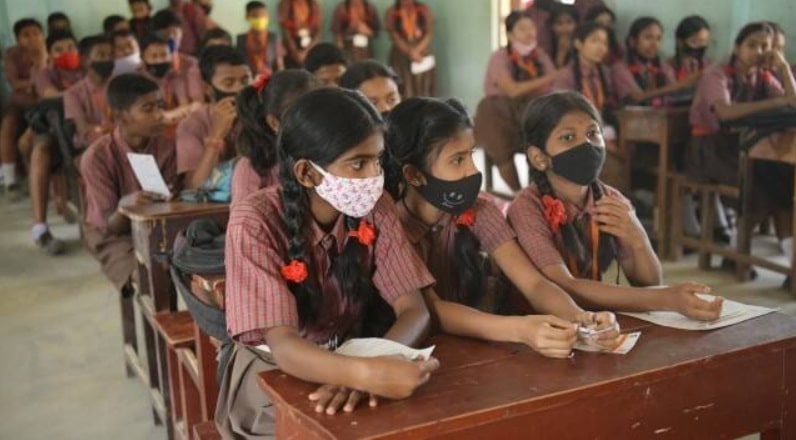What’s in today’s article?
- Why in news?
- National Curriculum Framework (NCF)
- What is NCF?
- National Education Policy 2020 and NCF
- News Summary: Draft National Curriculum Framework 2023
- What are the proposed changes in design of subjects and exams at secondary stage?
- How will teaching-learning change for younger students if the recommendations are implemented?
- When will these changes come into effect?
Why in news?
- The Ministry of Education released the pre-draft of the National Curriculum Framework (NCF) for school education for public feedback.
National Curriculum Framework (NCF)
What is NCF?
- The National Curriculum Framework (NCF) is a document that outlines the philosophy, goals, and objectives of education in India.
- It serves as a framework for designing school curricula, textbooks, and teaching practices.
- Previously, four NCFs (1975, 1988, 2000 and 2005) have been published by the NCERT in India.
- So, the current set of NCERT textbooks, barring the recent deletions, are all based on the NCF 2005.
National Education Policy 2020 and NCF
- The National Education Policy 2020 (NEP 2020) aims to devise four National Curriculum Frameworks (NCFs):
- National Curriculum Framework for Early Childhood Care and Education (NCFECCE)
- National Curriculum Framework for School Education (NCFSE)
- National Curriculum Framework for Teacher Education (NCFTE)
- National Curriculum Framework for Adult Education (NCFAE)
- Under the latest round of revision, draft frameworks on early childhood care and education and school education have already been prepared.
- Work on teacher and adult education is underway.
- Apart from textbooks, the NCF, after its adoption by the CBSE and other state boards, will also restructure various other aspects of the classroom, including choice of subjects, pattern of teaching, and assessment.
News Summary: Draft National Curriculum Framework 2023
What are the proposed changes in design of subjects and exams at secondary stage?
- Choice of subjects and exams in classes IX-XII
- Over two years, in class IX and X, the students will have to study 16 courses categorised under eight curricular areas.
- Students will be given a choice to pick 16 courses from eight curricular areas.
- The suggested curricular areas are Humanities (that includes languages), Mathematics & Computing, Vocational Education, Physical Education, Arts, Social Science, Science, and Inter-disciplinary Areas.
- Over two years, in class IX and X, the students will have to study 16 courses categorised under eight curricular areas.
- Links between class IX and X
- Students will have to clear eight board exams to obtain the final certification which will factor in their performances in exams held over two years.
- Each of these exams will assess their hold on courses they learnt in class IX and X.
- Under the current system, there are no such links between class IX and X and students across most boards have to pass at least five subjects to clear class X.
- In other words, modular Board Examinations will be offered as opposed to a single examination at the end of the year.
- The final certification will be based on the cumulative result of each of the examinations.
How will teaching-learning change for younger students if the recommendations are implemented?
- At the foundational level
- For children aged 3-8 enrolled in grades between preschool and class II, the pedagogical approach suggested is play based.
- It adds that textbooks are to be used from Grade 1 and most of the content should be concrete materials – toys, puzzles, and manipulatives.
- At the preparatory stage (For grades III, IV, V)
- Children are to be introduced to textbooks on languages, mathematics, while also retaining the activity and discovery-based approach.
- The middle stage (class VI, VII, VIII)
- In the middle stage (class VI, VII, VIII), natural as well as social sciences will be introduced.
- As per the NCF, the textbooks need to play a central role in mediating the content in the Middle Stage.
When will these changes come into effect?
- The government recently announced that textbooks based on the revised NCF will be taught in schools starting from the 2024-25 academic session.
- But a specific timeline on the implementation of the changes on exams, assessment and subject design has not been made available yet.
Q1) What is Early Childhood Care and Education ?
Early Childhood Care and Education (ECCE) refers to the educational and developmental experiences that children receive from birth to 8 years of age. It includes a wide range of activities that aim to promote the physical, cognitive, social, and emotional development of young children. ECCE encompasses a variety of programs and services, such as preschools, kindergartens, child care centers, and home-based care. These programs are designed to provide children with a safe and nurturing environment where they can learn, play, and develop social skills.
Q2) What is National Council of Educational Research and Training (NCERT)?
NCERT stands for National Council of Educational Research and Training. It is an autonomous organization under the Ministry of Education, Government of India. NCERT is responsible for developing and publishing textbooks, teacher training manuals, and educational materials for primary and secondary schools in India. The organization was established in 1961 with the goal of providing qualitative education to students in the country. It is headquartered in New Delhi and has regional offices across the country.
Source: NCF 2023 Draft: What are the proposed changes for the Indian school system? | National Portal of India | Indian Express
Last updated on July, 2025
→ UPSC Notification 2025 was released on 22nd January 2025.
→ UPSC Prelims Result 2025 is out now for the CSE held on 25 May 2025.
→ UPSC Prelims Question Paper 2025 and Unofficial Prelims Answer Key 2025 are available now.
→ UPSC Calendar 2026 is released on 15th May, 2025.
→ The UPSC Vacancy 2025 were released 1129, out of which 979 were for UPSC CSE and remaining 150 are for UPSC IFoS.
→ UPSC Mains 2025 will be conducted on 22nd August 2025.
→ UPSC Prelims 2026 will be conducted on 24th May, 2026 & UPSC Mains 2026 will be conducted on 21st August 2026.
→ The UPSC Selection Process is of 3 stages-Prelims, Mains and Interview.
→ UPSC Result 2024 is released with latest UPSC Marksheet 2024. Check Now!
→ UPSC Toppers List 2024 is released now. Shakti Dubey is UPSC AIR 1 2024 Topper.
→ Also check Best IAS Coaching in Delhi















